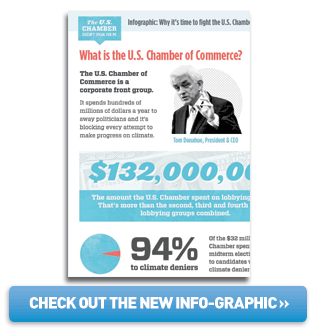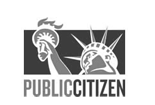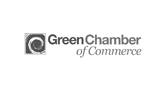Frequently Asked Questions
What is the U.S. Chamber of Commerce?
Founded in 1912, the U.S. Chamber of Commerce is “the world’s largest business federation.” As of 2009, the Chamber is a self-described “$200 million a year lobbying and political powerhouse” that represents “3 million businesses, nearly 3,000 state and local chambers, 830 associations, and over 90 American Chambers of Commerce abroad.” Based in Washington, DC, the Chamber of Commerce states that as “the voice of business, the Chamber’s core purpose is to fight for free enterprise before Congress, the White House, regulatory agencies, the courts, the court of public opinion, and governments around the world.”
Historically, it lobbied against involvement in World War II and the Civil Rights Act of 1964, and supported Sen. Joe McCarthy’s hearings demanding the hunting down of “subversives” and “communists” in the early 1950s. In the 1980s and 1990s, The U.S. Chamber fought to weaken clean air standards, opposed a hazardous waste dumping ban, and lobbied against the Kyoto greenhouse gas treaty.
In 2010, it spent over $33m on attack ads and elections throughout the country, 93% of that cash going to far-right conservative candidates intent on stopping the EPA from cleaning up our air and atmosphere.
In a tax document that was recently uncovered, it became clear that in 2009, the U.S. Chamber received 55% of its money of its money from only 16 donors—one whopping $86.2m donation from a group of 5 major health insurance companies.
Why the U.S. Chamber of Commerce? Aren’t there lots of nasty oil and coal companies that we should be picking on?
Money pollution, just like carbon dioxide, comes mostly from a few huge and dirty sources. Not coal-fired power plants, but lobby groups that recycle corporate contributions into political influence. They’ve always been there, but they’ve grown larger and more brazen in recent years, especially now that new Supreme Court decisions let them operate cloaked in secrecy.
The US Chamber of Commerce brags on its web page that it’s the biggest lobby in Washington, “consistently leading the pack in lobbying expenditures.” It’s no accident that the Chamber building sits directly across the street from the White House, or that each year in January its president delivers a “State of American Business” address.
And that, of course, is their right. But here’s the truth—at least when it comes to energy and climate, that claim to speak for three million American businesses is a fib.The Chamber of Commerce doesn’t have to say where they get their money, letting special interests work from the shadows. The Chamber has long opposed environmental standards, but on climate change, they’ve gone pretty near berserk.
In 2009, for instance, one of their Vice Presidents demanded a “Scopes monkey trial” on global warming: “it would be the science of climate change on trial,” the chamber’s senior vice-president for environment, technology, and regulatory affairs explained.
More recently, they petitioned the EPA to take no action on climate change, on the grounds that “populations can acclimatize to warmer climates via a range of range of behavioral, physiological, and technological adaptations.” We don’t know who those 16 companies are, but you can pretty much guess how they make their money, and why they use the Chamber to launder it.
Shouldn’t we hold Members of Congress accountable for taking the money, too?
As a new session of Congress opens, many politicians in Washington are already working to find ways to give more government handouts to greedy corporations. Worst amongst corporate offenders are dirty energy companies. Congress already plans to allow the wealthiest corporations in the world, companies like ExxonMobil and BP, to continue to dump pollution in our air, water and atmosphere for free and then stick Americans with the bill for any disasters or cleanups. We’re going to be holding members of Congress accountable all over the country, and making sure to make some noise about the ones who take dirty money at their offices and public events (you can check up on your own members at dirtyenergymoney.org).
When you have a problem with a store, you might ask to speak to the clerk—but if that doesn’t work, eventually you need to speak with the manager. Well, we’ve been asking for help for two decades from the folks in Congress, with nothing to show for it. It’s time to ask for the manager.
Local businesses are good for the country—they provide jobs. Are you against business?
We like small businesses—our friends and neighbors, and some of the most stalwart advocates for clean air and clean energy run them. We’re not angry with anyone, and we doubt that most small business owners have any idea that they’re being used as pawns in a propaganda campaign to benefit a few giant fossil fuel companies. We want to give local businesses and chambers of commerce every chance to explain to their customers and neighbors that they don’t need a Washington-based partisan attack group doing their politicking for them.
We also know that American business has always led the world in finding innovative solutions to tough problems like climate change. A new clean energy economy offers an unprecedented opportunity to improve our national security and grow our economy. America can create up to 1.9 million new jobs, reduce oil imports by 30%, increase annual household income above $1,100 and boost GDP up to $111 billion through comprehensive clean energy and climate policies.
America is at a crossroads—we can either be eclipsed by China and other emerging economies, or we can take advantage of the clean energy revolution and build a new, powerful economy that can lift America out of the recession and create jobs. The U.S. Chamber is actively campaigning against small businesses’ best interests—now it’s time to make our voices heard.
Who’s behind this campaign?
This campaign was launched by 350.org, an international climate advocacy network. We’re working closely with lots of partners. Want to be a partner? Get in touch at chamber@350.org.
What if I want to learn more?
Check out these statements of dissent to learn more about the corporations and local chambers of commerce that are already distancing themselves from the U.S. Chamber.
We know the U.S. Chamber of Commerce has also long opposed women’s rights, campaigned heavily against healthcare reform, collective bargaining, civil rights, consumer and public safety regulations and social security. Whatever issue you care deeply about, it’s time for citizens and small business to say enough is enough and take back our democracy.
For additional information about the U.S. Chamber and why we’re campaigning against them, visit the Resources page.
What’s the goal?
Thanks to the Supreme Court and its Citizens United decisions, there’s no way to keep the Chamber and others from running shadowy campaigns—as long as they’ve got companies pumping them money, they’ll keep up their dodgy operation. But the rest of us can stand up and be counted—we can tell the Congressmen taking their money that they don’t speak for us.
We need more big companies like Apple and Microsoft—it’s good to hear that Levi-Strauss and General Electric and Best Buy are making similar noises. We need more local chambers of commerce—it cheered us to hear the CEO of the Greater New York Chamber say “they don’t represent me,” or to hear the news from just a few weeks ago that the Seattle chamber had cut its ties.
But what makes us happiest is to hear small businesspeople across the US saying the same thing: when it comes to energy and climate, ‘The US Chamber Doesn’t Speak for Me.”
Across America, volunteers are fanning out to canvass local businesses—all those bakeries and beauty salons, colleges and chiropractors, florists and fitness centers who belong to their local chambers of commerce. They’ll be asking them to sign a statement, and offering them the chance to look into a camera and record the message that they think differently.
If we can weaken the U.S. Chamber of Commerce’s grip on our political life, then maybe we can save the Clean Air Act. Maybe we can finally get rid of the huge subsidies to our fossil fuel industries. Maybe we can finally get a law passed to start dealing with the worst crisis our planet has ever faced. We shouldn’t have to do this—in an ideal world, our leaders would simply heed the warnings of our wisest scientists and get to work. But we live in a messy world, made messier every day by the US Chamber of Commerce. It’s time to start cleaning up that mess—time to say “that’s not our mess, that’s yours.”
How will we win?
Make no mistake, the U.S. Chamber of Commerce is a formidable opponent. In early February, their law firm took bids from a ‘security firm’ that provided samples of the kind of work they do: pictures of their opponents’ children, for instance, or the news that one foe attended a “Jewish church” near Washington. The U.S. Chamber plays dirty, but it can’t stand up to overwhelming dissent among small businesses and local chambers of commerce is pretends to represent on Capitol Hill.
That’s why it’s important that we organize our communities and build up grassroots power to stop the U.S. Chamber from blocking progress. We’ll gather our friends, neighbors and coworkers together and go talk to each business owner individually, in thousands of towns and cities around the country. We’ll make sure they know about the U.S. Chamber and it’s poisonous influence in Washington, and we’ll ask them to sign a declaration that “The U.S. Chamber Doesn’t Speak for Me.”
Next time these small business owners take a seat at the local chamber of commerce meeting, we hope they’ll help draft an official letter or resolution explaining that the U.S. Chamber of Commerce doesn’t speak for that local chamber either. With each new business owner and local chamber that signs on, we’ll break the hold the U.S. Chamber has on Washington, and we’ll be one step closer to ensuring clean air and a safe planet for ourselves and our kids.









